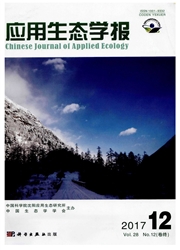

 中文摘要:
中文摘要:
凋落物分解是重要的森林生态系统过程之一,受到气候、凋落物质量、土壤生物群落等生物和非生物因素的综合调控.迄今,有关不同森林生态系统和不同树种地上部分的凋落物动态、凋落物分解过程中的养分释放动态、生物和非生物因素对凋落物分解的影响等研究报道较多,但对地下凋落物的分解研究相对较少.近年来,森林凋落物分解对以大气CO2浓度增加和温度升高为主要特征的全球变化的响应逐步受到重视,但其研究结果仍具有很多不确定性.因此,未来凋落物生态研究的重点应是凋落物分解对土壤有机碳固定的贡献、地上/地下凋落物的物理、化学和生物学过程及其对各种生态因子(例如冻融、干湿交替)及交互作用的响应、凋落物特别是地下凋落物分解对全球气候变化的响应机制等方面.
 英文摘要:
英文摘要:
Litter decomposition is one of the important processes in forest ecosystem, which is controlled by both biotic and abiotic factors such as climate, litter quality, and soil organisms. Up to now, numerous studies have been made on the dynamics of aboveground litter in different forest ecosystems, nutrient release during its decomposition, and effects of biotic and abiotic factors on the decomposition, but less information has been reported on the decomposition of belowground forest litter. Recently, the responses of forest litter decomposition to global climate change characterized by elevated atmospheric CO2 concentration and temperature have got worldwide concern, but there remains unceltainty in research results. In the further study, more attention should be paid on the contribution of forest litter decomposition to soil organic carbon sequestration, the physical, chemical and biological processes of below- and above-ground litter decomposition, the responses of forest litter decomposition to the ecological factors (e. g. seasonal freeze-thaw cycle and drying-rewetting cycle) and their interactions, and the mechanisms of litter ( especially belowground litter) decomposition responses to global climate change.
 同期刊论文项目
同期刊论文项目
 同项目期刊论文
同项目期刊论文
 期刊信息
期刊信息
